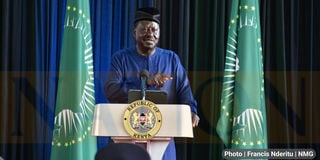Recalibrate Raila campaign for him to clinch AUC seat

I recently attended a workshop organised by the Global Centre for Policy and Strategy (GLOCEPS), a renowned think tank in Nairobi and Raila Odinga’s African Union Chair (AUC) bid Secretariat that aimed at recalibrating his campaign efforts so as to secure this elusive African Union Commission chair position.
Kenya had about eight years ago fielded top diplomat, Ms Amina Mohamed, who unfortunately narrowly lost to current African Union Commission Chair Moussa Faki Mahamat, and is keen to avoid similar mistakes. While it was clear that Kenya’s candidate, Raila Odinga was indeed an exceptional candidate with a track record that fits the AUC seat, this strength has to be projected differently to the various heads of states and governments in Africa, who are the electors of the AUC.
While there are other contestants for the AUC chair, it is clear that Djibouti’s candidate Mahamoud Ali Youssouf may be a strong contestant against Raila Odinga. Others are Richard Randriamandrato of Madagascar and Anil Gayan of Mauritius, and it is safe not to underestimate any candidate as an underdog.
While the AUC bid is a personal bid, a candidate is sponsored by respective states, and Raila Odinga is therefore Kenya’s candidate, carrying the aspirations and credentials of Kenya. Despite the several nuances at play, I summarise my personal reflections on Raila Odinga’s bid as AUC, and the complexities his AUC secretariat and Government of Kenya have to navigate to project the candidate favourably in a continent with diverse interests:
Firstly, campaigns for the seat must be as personal as possible, and the aspirations of the candidate made clear to various heads of states and governments who are the electors. In this regard, personal connections and networks are very key, and must be leveraged to secure an endorsement and consolidate his support. Secondly, while Kenya has admirable democratic credentials that so called “progressive societies” may find admirable, these same credentials may be perceived as a threat by countries with less democratic space and more personalised leadership styles.
There is therefore need for the candidate and Government of Kenya to acknowledge that various governments in Africa have unique leadership styles, and Raila’s candidature as AUC chair will not in any way threaten such regimes. Kenya’s democratic ideals may be emphasised in countries like Botswana, South Africa and Ghana among others, while played down in less democratic regimes, where leaders have a strong grip on power.
Thirdly, while the Anglophone-Francophone-Lusophone narratives are waning, and individual states are increasingly considering national interests over their colonial legacies, the influence of colonial masters in various states in Africa cannot be completely ignored. While France’s influence may appear to be waning in West Africa and the Sahel, and that of Russia and China seemingly rising, many leaders in Africa still have close connections with the metropole, and colonial ties may still influence voting patterns of the AUC.
Fourthly, Kenya’s close ties especially with the West may wrongly project her and her candidate as a poodle of the West and therefore not capable of independently driving the Agenda 2063 of the Africa we Want. Kenya’s position on the Israel-Palestine conflict, the deployment of Kenyan police to Haiti, and recent unpopular taxes that is blamed on International Monetary Fund (IMF) reforms are some of the issues that may negatively project the Kenyan candidate, especially among Africa leaders with a strong stance against what they perceive as imperialism. In this case, it is important to emphasise Raila Odinga’s strong stance and personality as a formidable Pan-Africanist, and not one who will succumb to imperial advances as AUC.
Dr Kirui, PhD teaches History and Government at University of [email protected]





